Algolia vs Experro: Comparing 6 Algolia Alternatives
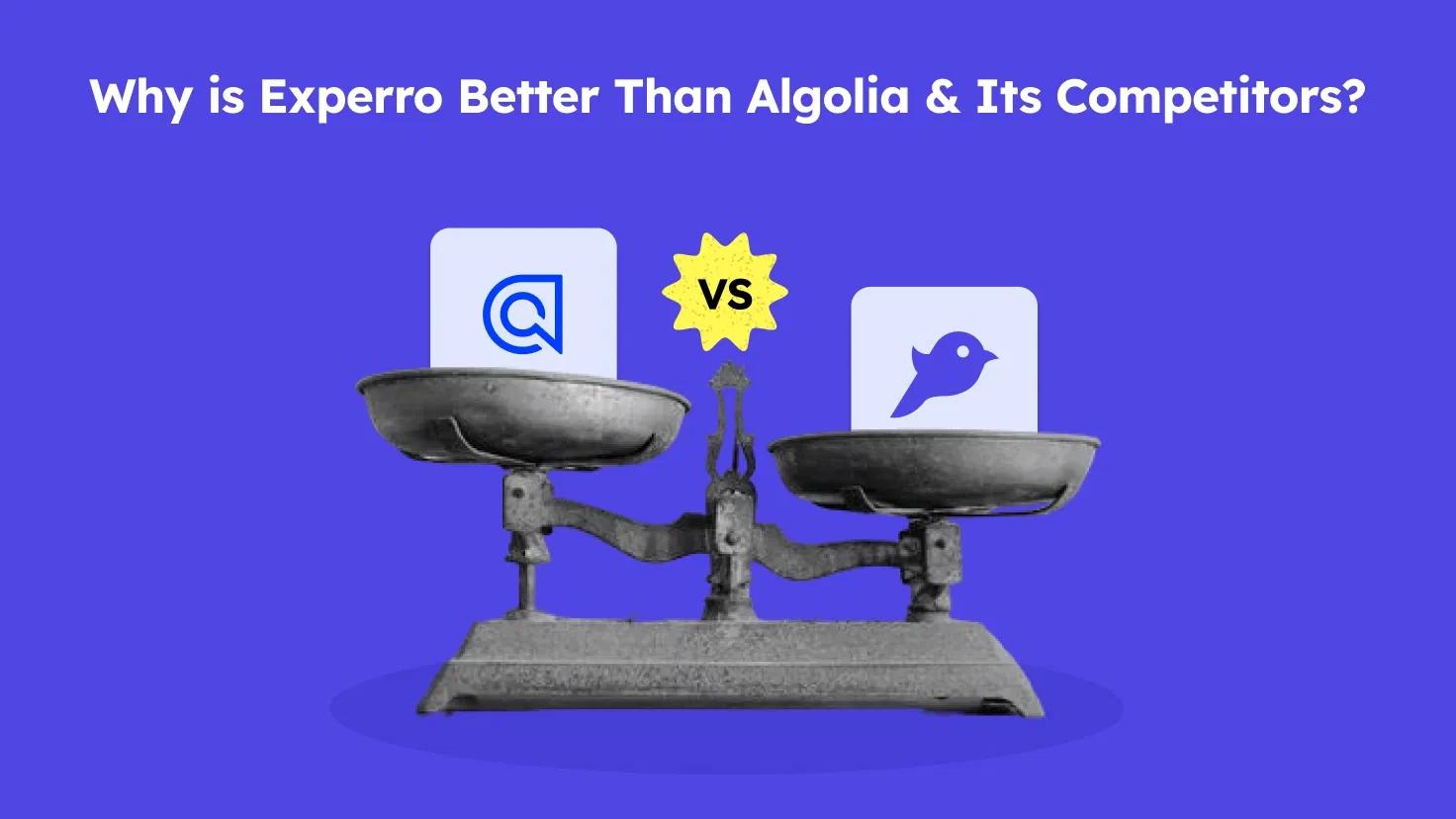
What’s Inside
- Where Algolia Fails to Deliver: Key Limitations Holding Your e-store Back
- What Do Clients Say About Algolia?
- Searching for Algolia Competitors ? Here Are 6 Top Picks
- The Ultimate Comparison of Algolia Alternatives
- Why Does Algolia’s High Cost Not Justify Its Offerings?
- To Conclude – Algolia vs Experro
Key Takeaways
- Algolia’s limitations make it a less suitable choice for businesses looking for seamless search and merchandising.
- Exploring the best Algolia alternatives can help your business achieve better scalability, personalization, ease of use, and achieve customer satisfaction.
- Choosing the right alternative of Algolia will ensure greater flexibility in adapting to evolving market trends and business needs.
- Experro provides a powerful, all-in-one solution with built-in Gen AI search, merchandising, and personalization for a superior agentic experience.
Choosing the right site search platform can make or break your customer’s eCommerce experience.
While Algolia is a well-known name, it comes with several drawbacks that may limit its effectiveness. Many struggle with Algolia performance issues, high costs, and a lack of built-in search features essential for seamless operations.
If you’re looking for the best Algolia competitors, understanding its shortcomings is crucial.
This blog covers the limitations of Algolia search, the top Algolia alternatives for 2025, and why Experro is the best AI-powered Algolia alternative for businesses seeking better results.
Now, let’s dive directly into “Why switch from Algolia to another search solution?”
Where Algolia Fails to Deliver: Key Limitations Holding Your e-store Back
While Algolia offers the best search API for eCommerce sites, it falls short in several critical areas.
Let’s examine the key problems with Algolia search and why many existing Aloglia e-store owners are actively looking for Algolia alternatives.
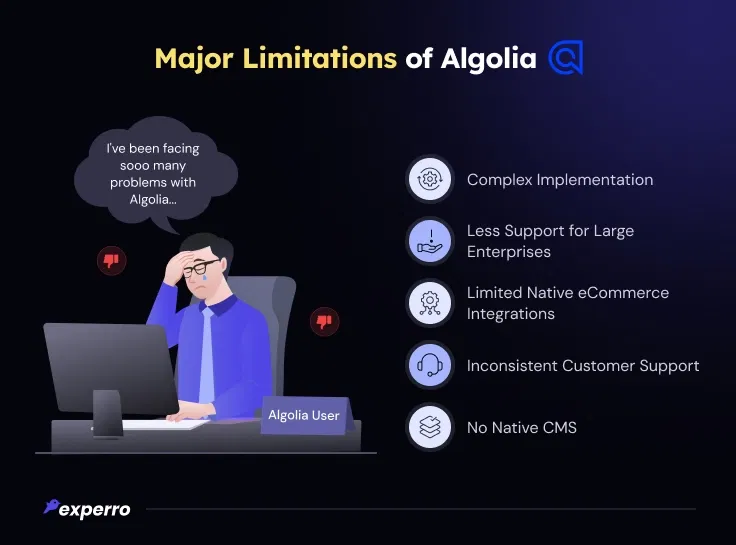
1. Complex Implementation & Developer Dependency
Setting up and customizing a store on Algolia requires deep technical expertise. Its configuration demands constant developer intervention, making it difficult for non-technical teams to manage search relevance and merchandising efficiently.
For companies seeking an Algolia replacement for eCommerce search, a seamless, low-code/no-code search solution is essential.
Many businesses struggle with custom indexing configurations, API dependencies, and scripting-heavy implementations that require ongoing maintenance.
Without a user-friendly interface for NLP search management, teams must rely on engineering resources for even minor updates. This leads to slower response times and higher operational costs.
2. Limited Support for Large & Frequently Updated Catalogs
Handling large and frequently changing product catalogs is another scalability issue with Algolia. Indexing large datasets can slow performance, leading to outdated search results and delayed product availability.
eCommerce catalog management helps businesses to handle large inventories efficiently, ensuring seamless scalability and real-time data updates.
However, Algolia’s indexing process can be both—resource-intensive and time-consuming. This causes delays in reflecting new arrivals, stock updates, or pricing changes.
Also, this leads to customer frustration when they see out-of-stock items in search results or miss out on newly launched products. Scalability concerns also arise as businesses grow, making fast and relevant search experiences harder.
3. Limited Native eCommerce Integrations
Algolia lacks deep, native integrations with major eCommerce platforms. Businesses often struggle to integrate it with platforms like Magento, Shopify or headless commerce solutions, requiring custom development efforts.
This lack of seamless connectivity can slow down implementation and increase overall costs.
Companies must invest in additional middleware, APIs, or third-party development without pre-built connectors or direct integrations to bridge the gap.
This creates potential compatibility issues, higher maintenance costs, and increased risk of data sync failures, leading to an inefficient user search and discovery experience.
In January 2023, security researchers identified that over 1,500 applications were leaking Algolia API keys and application IDs, with some exposing critical Admin API keys. This posed significant security risks, including unauthorized access to user data.
4. Inconsistent Customer Support & Documentation Challenges
Many users report problems with Algolia search due to poor support and confusing documentation. Getting timely assistance for critical scalability issues with Algolia can be frustrating, especially for businesses with mission-critical search functionality.
Without clear documentation and responsive support, troubleshooting becomes a major challenge.
Businesses often struggle with unresolved multi language support tickets, slow response times, and lack of hands-on guidance, especially when implementing complex customizations.
The documentation lacks clarity, making it difficult for teams to quickly find solutions. This leads to prolonged downtime and inefficiencies in managing search relevance and site performance.
5. No Native CMS or Digital Experience Capabilities
As one of the cons of Algolia, it doesn’t offer a built-in CMS or digital experience platform (DXP) capabilities.
Businesses must rely on multiple platforms for content management and search, increasing operational costs and complexity. This lack of a unified approach makes content-driven commerce harder to manage.
Without an integrated CMS, businesses must use separate platforms for content updates, product information, and on-site search, leading to inefficiencies in workflow and content personalization.
Managing content-driven experiences—such as landing pages, banners, and personalized content—becomes an additional burden when search is disconnected from the overall site experience.
What Do Clients Say About Algolia?
The below image highlights key concerns users have with Algolia. While it offers a variety of features, the setup process is often seen as complex and time-consuming, requiring additional configuration.
Additionally, users have reported issues with customer support, including ongoing billing problems and unresponsiveness, leading to frustration and dissatisfaction.
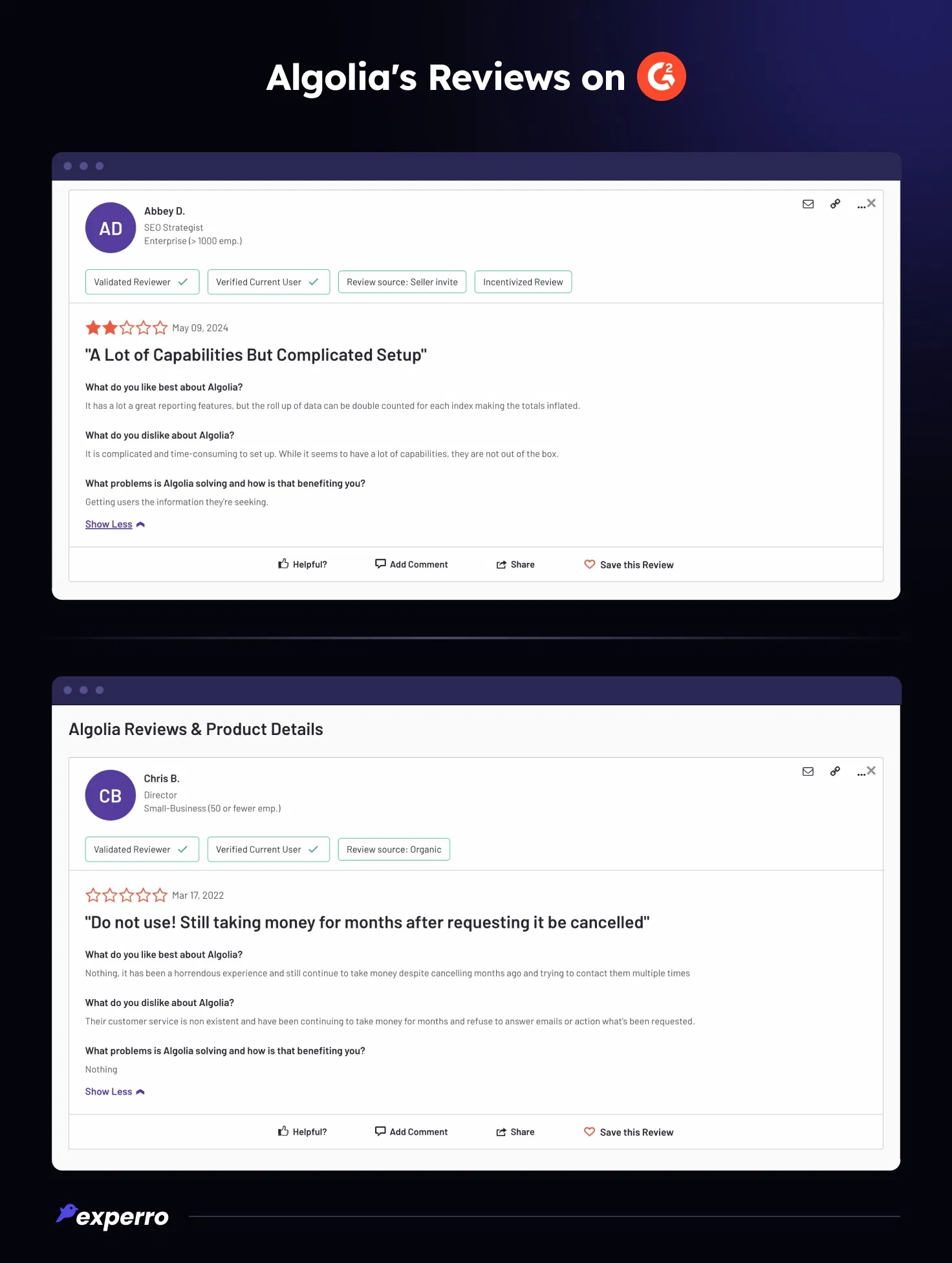
Source: G2 Review 1 | G2 Review 2
The below image showcases user concerns about Algolia's usability on Capterra. Reviewers mention confusion with the UI and terminology, misleading search results when information isn't precise, and internal error messages attributed to the platform.
Additionally, developers highlight documentation as a major pain point, impacting ease of use and troubleshooting.
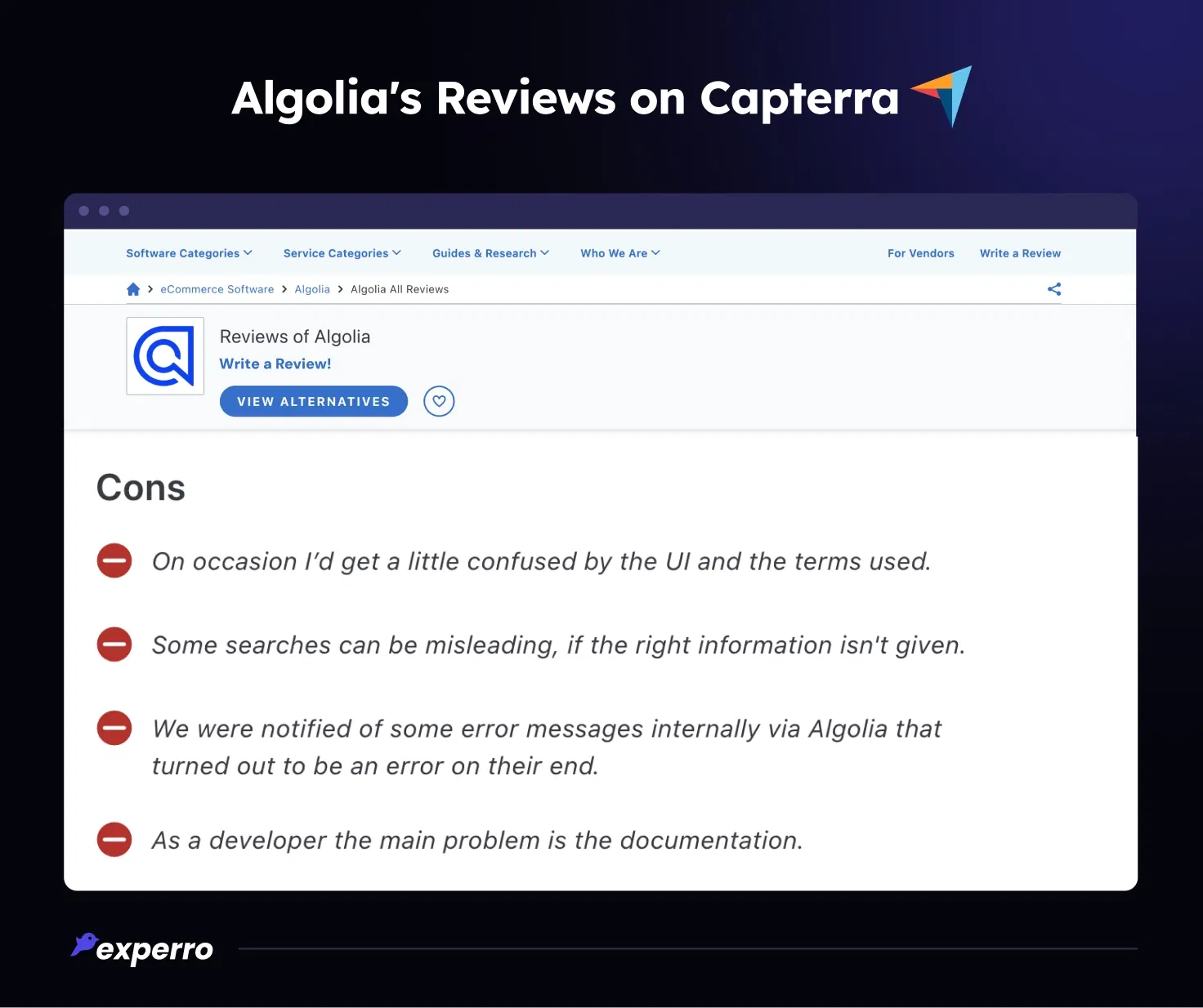
Source: Capterra
Searching for Algolia Competitors ? Here Are 6 Top Picks
If you’re struggling with Algolia limitations, switching to a better alternative is the next logical step.
Here’s a comparison of the best alternatives to Algolia, with a focus on key features, pros, and cons.
1. Experro – #1 Agentic Experience Platform

Experro is an agentic experience platform that provides agentic experiences going far and beyond the customer expectations.
It is equipped with AI-driven search functionalities, personalization, machine learning, and real-time catalog updates, eliminating the need for third-party tools.
Unlike many Algolia competitors, Experro enables no-code search customization and also offers advanced rule management, allowing businesses to fine-tune search results based on specific conditions. This allows business teams to manage instant search experiences without technical dependencies.
With its built-in headless CMS, businesses can seamlessly handle both content and commerce, enhancing customer engagement. Experro also delivers fast and highly tailored search results, helping businesses improve conversion rates and sales.
Pros:
✅ AI-driven personalization and eCommerce merchandising for better customer experiences.
✅ No-code customization for search relevance adjustments without developer help.
✅ Real-time catalog updates to ensure accurate product listings.
✅ Seamless integration with major eCommerce platforms for faster deployment.
✅ Built-in CMS to manage content and commerce in one platform.
✅ 24/7 dedicated customer support for quick issue resolution.
Cons:
❌ None found.
2. Bloomreach

Bloomreach provides strong AI-driven valuable insights and good eCommerce integrations, making it a solid option for large enterprises.
However, its high pricing compared to the other competitors of Algolia and steep learning curve make it less accessible for smaller businesses. It also requires extensive developer support, limiting agility.
Pros:
✅ Powerful AI-driven insights for better decision-making.
✅ Good eCommerce platform integrations.
✅ Advanced search analytics for performance tracking.
Cons:
❌ High pricing structure compared to competitors.
❌ Steep learning curve.
❌ Requires extensive developer support.
❌ Limited merchandising control.
❌ No built-in CMS.
3. Coveo
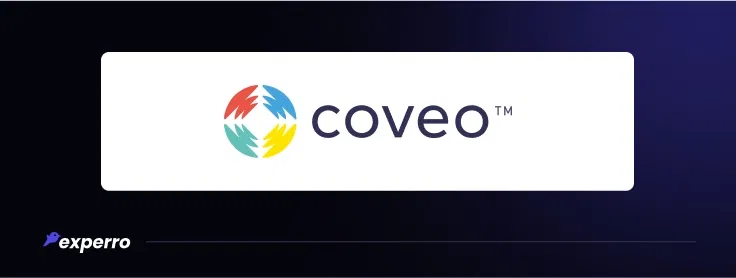
Coveo delivers AI-powered recommendations and enterprise-grade image search, making it ideal for large organizations.
However, it is expensive for mid-sized businesses and requires advanced technical expertise. Its long implementation time and limited real-time catalog updates can slow down operations.
Pros:
✅ AI-driven search recommendations for personalized experiences.
✅ Enterprise-grade Algolia search alternative, designed for large-scale businesses.
✅ Robust analytics for data-driven insights.
Cons:
❌ Expensive for mid-sized businesses.
❌ Requires advanced technical expertise.
❌ Long implementation time.
❌ Limited real-time catalog updates.
❌ Poor customer support.
4. Elastic Enterprise Search
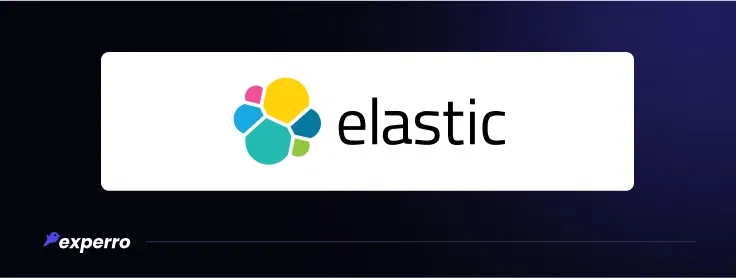
As an open-source alternative, Elastic Enterprise Search offers great flexibility and scalability.
However, it demands extensive setup and maintenance, lacks built-in merchandising features, and is not eCommerce-focused. Poor quality documentation makes troubleshooting difficult.
Pros:
✅ Open-source flexibility for custom implementations.
✅ Good scalability for growing businesses.
✅ Strong community support.
Cons:
❌ Requires extensive setup.
❌ No built-in merchandising features.
❌ Not eCommerce-focused.
❌ Poor documentation support.
❌ Higher maintenance costs.
5. Luigi’s Box

Luigi’s Box is easy to set up and provides detailed search analytics. However, it lacks CMS and digital experience features.
Its high dependency on manual adjustments makes it unsuitable for large catalogs.
Pros:
✅ Simple setup for quick deployment.
✅ Good search analytics for performance tracking.
✅ User-friendly interface.
Cons:
❌ No built-in CMS or digital experience features.
❌ High dependency on manual adjustments.
❌ Not ideal for large catalogs.
❌ Poor customer support.
6. Searchspring

Searchspring is one of the site search platforms like Algolia. It focuses on merchandising and provides a user-friendly dashboard. However, it lacks advanced AI-driven personalization, making search relevance adjustments manual.
It also has limited scalability and high dependency on third-party tools, making integration more complex.
Pros:
✅ Strong merchandising capabilities.
✅ User-friendly dashboard for ease of use.
✅ Customizable search filtering options.
Cons:
❌ Lack of advanced AI-driven personalization.
❌ Limited scalability.
❌ Poor integration options.
❌ High dependency on third-party tools.
❌ Expensive for small businesses.
The Ultimate Comparison of Algolia Alternatives
Choosing the right search solution can be overwhelming with so many options available.
If you're looking for a powerful Algolia alternative, this comparison will help you understand how leading platforms stack up, including Algolia’s competitors’ pricing and features.
| Feature | Experro (Best Choice) | Bloomreach | Coveo | Elastic Enterprise Search | Luigi’s Box | Searchspring |
|---|---|---|---|---|---|---|
| AI-Powered Search | ✅ Advanced AI-driven search with real-time learning | ✅ | ✅ | ❌ | ✅ | ✅ |
| Built-in Merchandising | ✅ Native merchandising tools | ✅ | ✅ | ❌ | ✅ | ✅ |
| Headless & Composable | ✅ Fully headless, composable DXP | ✅ | ✅ | ✅ | ❌ | ❌ |
| Hyper-Personalization | ✅ AI-powered, behavior-based personalization | ✅ | ✅ | ❌ | ✅ | ✅ |
| Speed & Performance | ✅ Lightning-fast with optimized indexing | ✅ | ✅ | ✅ | ✅ | ✅ |
| Advanced Search Features | ✅ AI-driven ranking, typo tolerance, contextual relevance | ✅ | ✅ | ❌ | ✅ | ✅ |
| Analytics & Insights | ✅ In-depth analytics for search & merchandising | ✅ | ✅ | ✅ | ✅ | ✅ |
| Ease of Use | ✅ No-code & developer-friendly | ❌ | ❌ | ❌ | ✅ | ✅ |
| Pricing | ✅ Cost-effective with transparent pricing | ❌ High | ❌ High | ❌ Complex | ❌ Mid-tier | ❌ Mid-tier |
| Best For | ✅ eCommerce (Jewelry, Retail, etc. Brands) | Enterprise eCommerce | Enterprises | Developers, Large Data | Mid-market | Mid-market eCommerce |
When you compare Algolia vs Experro, it’s clear that Experro offers more flexibility and affordability, especially with its AI-driven personalization and built-in merchandising.
Why Does Algolia’s High Cost Not Justify Its Offerings?
Let’s talk money!
Many businesses find pricing of Algolia to be excessive, considering its feature limitations.
Algolia's pricing is steep, making it costly for businesses to scale. Hidden costs, like overage fees and add-ons, can quickly drive up expenses.
The lack of built-in personalization, manual effort for merchandising, and poor scalability make it an overpriced solution.
On the other hand, Experro offers a transparent pricing model with no hidden fees. It’s efficient, cost-effective, and a powerful alternative worth considering.
The platform provides an all-in-one digital experience platform, eliminating the need for multiple tools while ensuring cost-effectiveness and scalability.
To Conclude – Algolia vs Experro
Finding the right Algolia competitor is essential for businesses seeking better scalability, personalization, and affordability.
While several alternatives to Algolia exist, Experro stands out as the best AI-powered Algolia alternative.
Algolia is a robust search solution, but Experro offers more with AI-driven search, merchandising, and a built-in headless CMS.
While Algolia focuses on search, Experro provides complete digital experience, ensuring better personalization, scalability, and efficiency for eCommerce businesses.
Connect with our experts on a call for a personalized demo.
FAQs


Pallavi Dadhich
21 March 2025Pallavi is an ambitious author known for her expertise in crafting compelling content across various domains. Beyond her professional pursuits, Pallavi is deeply passionate about continuous learning, often immersing herself in the latest industry trends. When not weaving words, she dedicates her time to mastering graphic design.